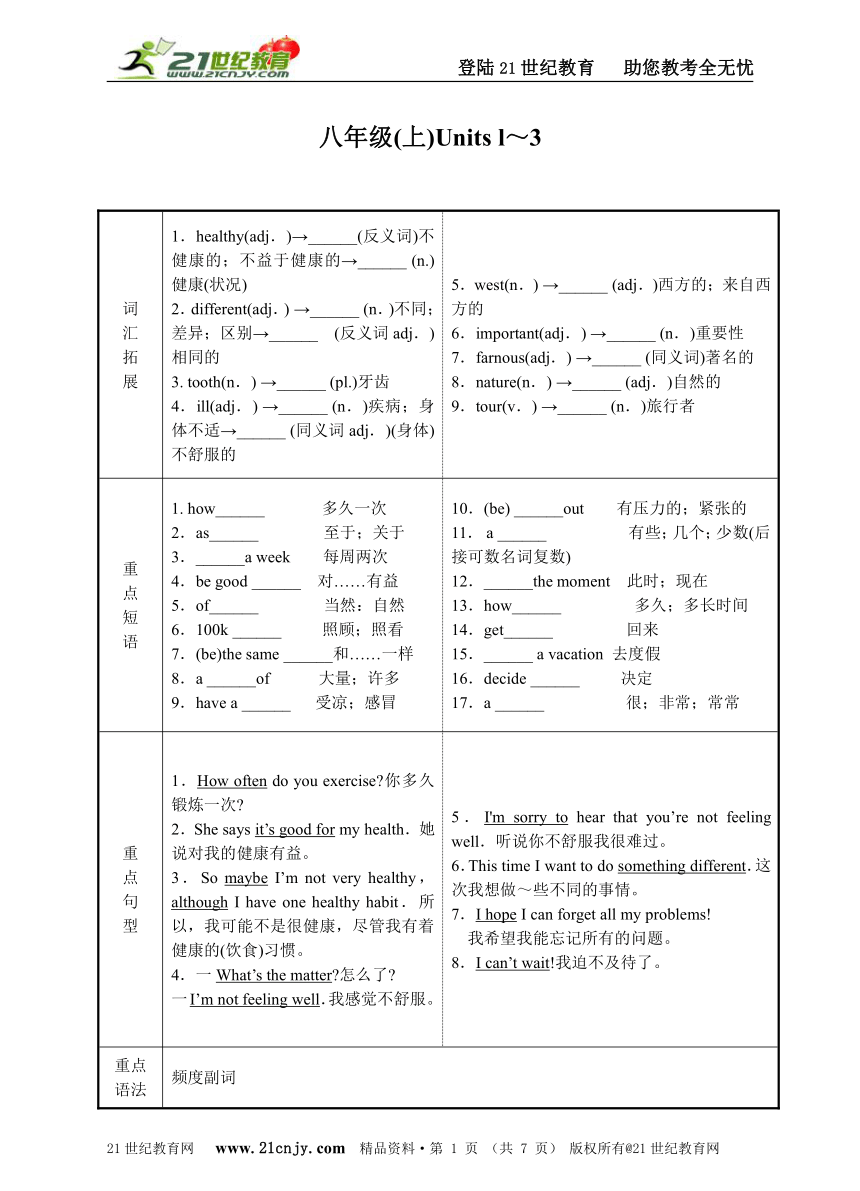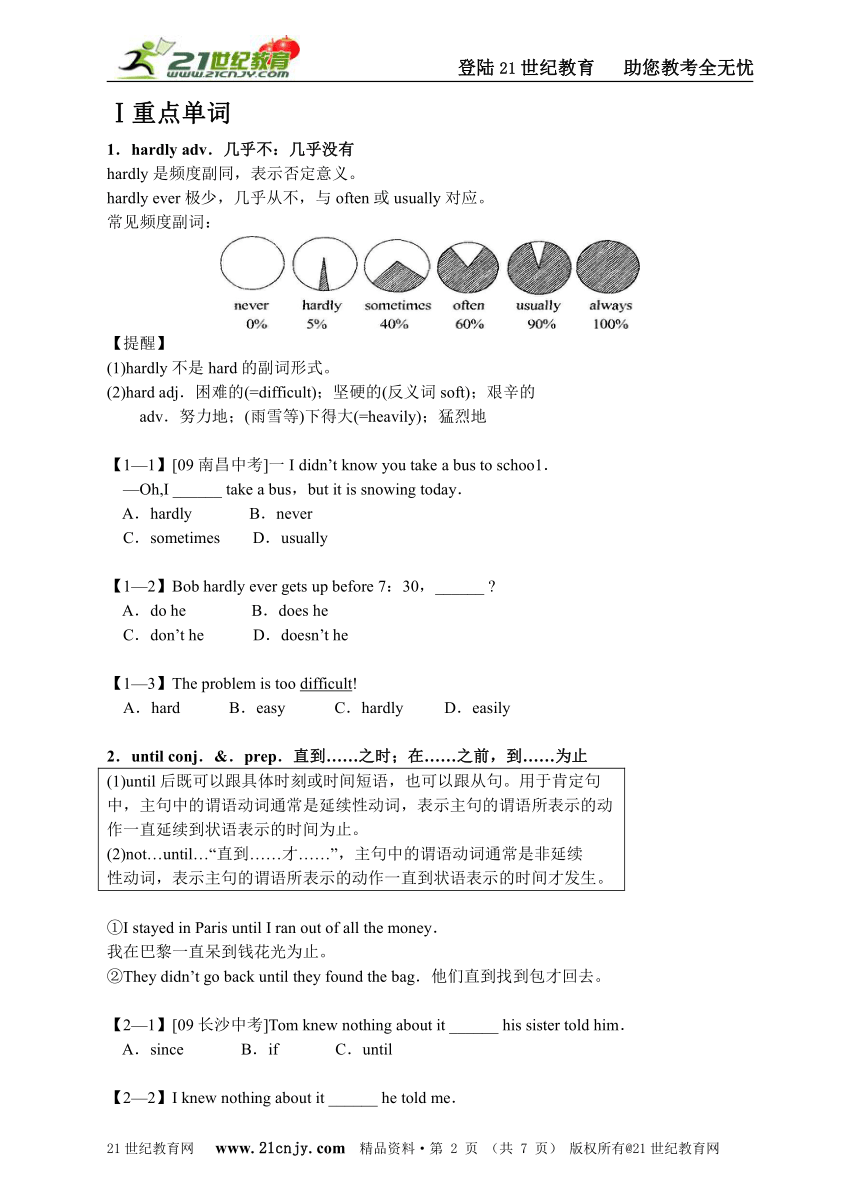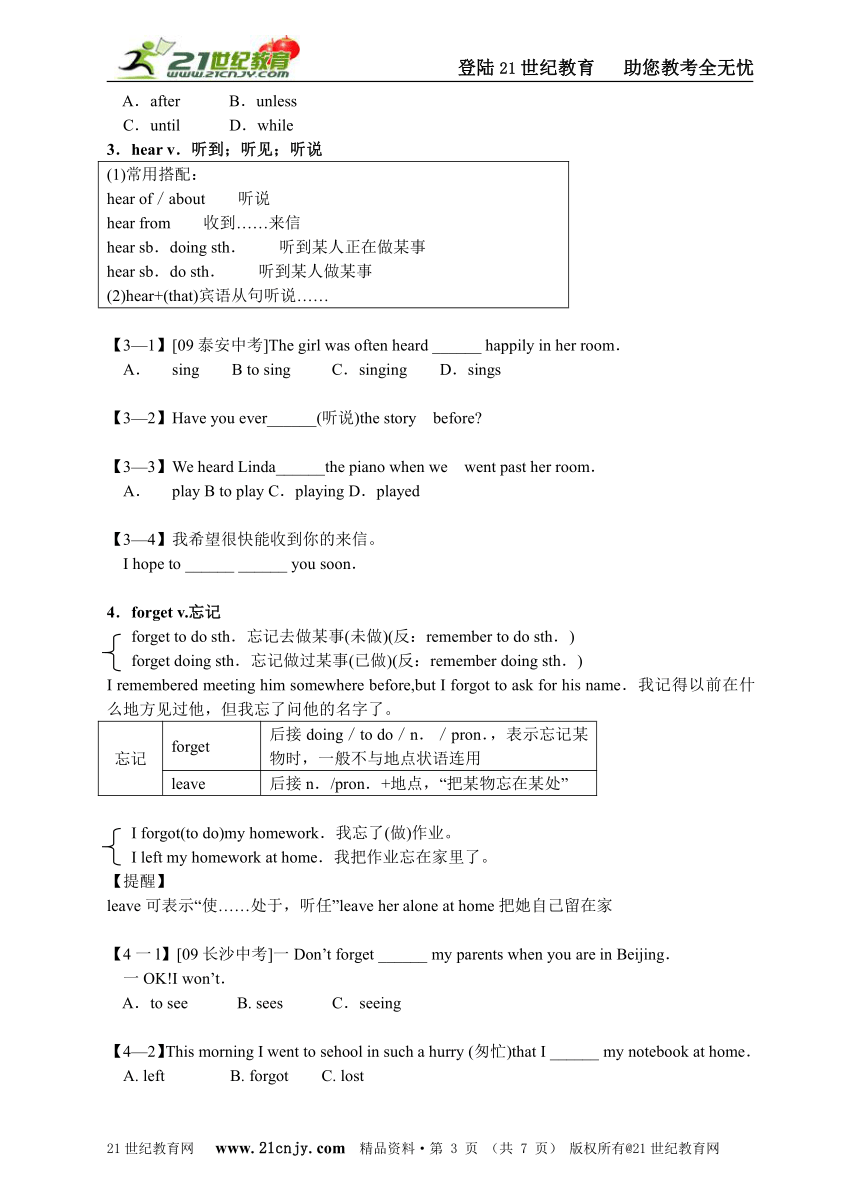八年级(上)units 1~3
图片预览



文档简介
登陆21世纪教育 助您教考全无忧
八年级(上)Units l~3
词汇拓展 1.healthy(adj.)→______(反义词)不健康的;不益于健康的→______ (n.)健康(状况)2.different(adj.) →______ (n.)不同;差异;区别→______ (反义词adj.)相同的3. tooth(n.) →______ (pl.)牙齿4.ill(adj.) →______ (n.)疾病;身体不适→______ (同义词adj.)(身体)不舒服的 5.west(n.) →______ (adj.)西方的;来自西方的6.important(adj.) →______ (n.)重要性7.farnous(adj.) →______ (同义词)著名的8.nature(n.) →______ (adj.)自然的9.tour(v.) →______ (n.)旅行者
重点短语 1. how______ 多久一次2.as______ 至于;关于3.______a week 每周两次4.be good ______ 对……有益5.of______ 当然:自然6.100k ______ 照顾;照看7.(be)the same ______和……一样8.a ______of 大量;许多9.have a ______ 受凉;感冒 10.(be) ______out 有压力的;紧张的11. a ______ 有些;几个;少数(后接可数名词复数)12.______the moment 此时;现在13.how______ 多久;多长时间14.get______ 回来15.______ a vacation 去度假16.decide ______ 决定17.a ______ 很;非常;常常
重点句型 1.How often do you exercise 你多久锻炼一次 2.She says it’s good for my health.她说对我的健康有益。3.So maybe I’m not very healthy,although I have one healthy habit.所以,我可能不是很健康,尽管我有着健康的(饮食)习惯。4.一What’s the matter 怎么了 一I’m not feeling well.我感觉不舒服。 5.I'm sorry to hear that you’re not feeling well.听说你不舒服我很难过。6.This time I want to do something different.这次我想做~些不同的事情。7.I hope I can forget all my problems! 我希望我能忘记所有的问题。8.I can’t wait!我迫不及待了。
重点语法 频度副词21世纪教育网
Ⅰ重点单词21世纪教育网
1.hardly adv.几乎不:几乎没有21世纪教育网
hardly是频度副同,表示否定意义。
hardly ever极少,几乎从不,与often或usually对应。
常见频度副词:
( http: / / www.21cnjy.com )
【提醒】
(1)hardly不是hard的副词形式。
(2)hard adj.困难的(=difficult);坚硬的(反义词soft);艰辛的
adv.努力地;(雨雪等)下得大(=heavily);猛烈地
【1—1】[09南昌中考]一I didn’t know you take a bus to schoo1.
—Oh,I ______ take a bus,but it is snowing today.
A.hardly B.never
C.sometimes D.usually
【1—2】Bob hardly ever gets up before 7:30,______
A.do he B.does he
C.don’t he D.doesn’t he
【1—3】The problem is too difficult! 21世纪教育网
A.hard B.easy C.hardly D.easily
2.until conj.&.prep.直到……之时;在……之前,到……为止
(1)until后既可以跟具体时刻或时间短语,也可以跟从句。用于肯定句中,主句中的谓语动词通常是延续性动词,表示主句的谓语所表示的动作一直延续到状语表示的时间为止。(2)not…until…“直到……才……”,主句中的谓语动词通常是非延续性动词,表示主句的谓语所表示的动作一直到状语表示的时间才发生。
①I stayed in Paris until I ran out of all the money.
我在巴黎一直呆到钱花光为止。
②They didn’t go back until they found the bag.他们直到找到包才回去。
【2—1】[09长沙中考]Tom knew nothing about it ______ his sister told him.
A.since B.if C.until
【2—2】I knew nothing about it ______ he told me.
A.after B.unless21世纪教育网
C.until D.while21世纪教育网
3.hear v.听到;听见;听说21世纪教育网
(1)常用搭配:hear of/about 听说hear from 收到……来信hear sb.doing sth. 听到某人正在做某事hear sb.do sth. 听到某人做某事(2)hear+(that)宾语从句听说……
【3—1】[09泰安中考]The girl was often heard ______ happily in her room.
A. sing B to sing C.singing D.sings
【3—2】Have you ever______(听说)the story before
【3—3】We heard Linda______the piano when we went past her room.
A. play B to play C.playing D.played
【3—4】我希望很快能收到你的来信。
I hope to ______ ______ you soon.
4.forget v.忘记
forget to do sth.忘记去做某事(未做)(反:remember to do sth.)
forget doing sth.忘记做过某事(已做)(反:remember doing sth.)
I remembered meeting him somewhere before,but I forgot to ask for his name.我记得以前在什么地方见过他,但我忘了问他的名字了。
忘记 forget 后接doing/to do/n./pron.,表示忘记某物时,一般不与地点状语连用
leave 后接n./pron.+地点,“把某物忘在某处”
I forgot(to do)my homework.我忘了(做)作业。21世纪教育网
I left my homework at home.我把作业忘在家里了。21世纪教育网
【提醒】
leave可表示“使……处于,听任”leave her alone at home把她自己留在家
【4一l】[09长沙中考]一Don’t forget ______ my parents when you are in Beijing.
一OK!I won’t.
A.to see B. sees C.seeing
【4—2】This morning I went to sehool in such a hurry (匆忙)that I ______ my notebook at home.
A. left B. forgot C. lost
【4—3】他不记得告诉她这件事了。21世纪教育网
He ______ ______ her about it.21世纪教育网
Ⅱ重点短语
1.how often多久一次
辨析
短语 含义 提问内容
how ofter 多久一次 频度(sometimes;once a week)
how long ①多长②多久 ①物体长度(20 meters long)②时间段(since l978;for 30years)
how soon 多久之后 in + 时间段
how far 多远 距离(5 minutes’walk)
【1—1】[09湖州中考]一______ do you visit your uncle
一Once a week,at least.
A.How long B.How many
C.How often D.How soon
【1—2】The bus station is about 500 meters away.(对划线部分提问)
_____ ______ is the bus station
【1—3】一______ have you lived in China 21世纪教育网
一Since 2000.
A.How long B.How much
C.How often D.How soon
2.1ook after照顾;照料;看管
(1)照顾:look after=take care of照顾好:look after…well=take good care of...(2)take care=be careful=look out小心;注意
一Take care!The traffic is busy!小心!交通很拥挤!
—Don’t worry.I can look after myself well.别担心,我会照顾好自己的。
【2—1】[08河南中考]Amy,I’ll be on holiday for a week.Could you help me _____my dog
A.look for B.look at
C.look after D.look over
【2—2】My grandpa is too old to ______ himself.
A.1ook good after B.take care of21世纪教育网
C.100k out D.be careful21世纪教育网
Ⅲ重点句型
1.So maybe I’m not very healthy,although I have one healthy habit.
所以,我可能不是很健康,尽管我有着健康的(饮食)习惯。【Unit l)
(1)maybe副词,表示“可能;也许”,常用于句首,可替换为perhaps;可与may进行句型转换。
Maybe the man is French.=The man may be French.
这个人可能是法国人。
(2)although/thou曲引导让步状语从旬,从句在主句之前/之后皆可。
We arrive at school on time every day.although(=though)sometimes the weather is bad.虽然有时天气不好,但我们每天都按时到校。21世纪教育网
【1—1】[09南京中考]______ scientists have done a lot of research on A(H1N1)flu,there are still some cases for further study.21世纪教育网
A. As B.Once C.If D.Although21世纪教育网
【1—2】Maybe the children are too tired.Let them take a rest.
A.Perhaps B.May
C.Should D.Sure
【1—3】Though his family was poor,______ he worked hard and did well in his lesson.
A.but B.yet C.and D.so
2.一What’s the matter 怎么了
一I’m not feeling well.我觉得不舒服。(Unit 2)
(1)What’s the matter(with sb.) =What’s wrong/the trouble(with sb.) =What’s up 用于询问“(某人)怎么了(哪儿不舒服/出了什么事) ”,作为宾语从句时句序不变。
—What’s wrong with Tom
—He has a headache./He lost his pen.
(2)well
adj.健康的(=healthy);(身体)舒服的
She didn’t feel so well yesterday.
adv.好(对应形容词good)
She sings well.
【2—1】[08北京中考]王芳还没来,她怎么了
Wang Fang hasn’t come yet.
_____ ______ ______ her
【2—2】一What’s ______ with you
一I have a toothache.
A.the wrong B.the matter
C.up D.matter
3.I'm sorry to hear that you’re not feeling well.
听说你不舒服。我很同情。(Unit 2)
(1)句中that引导的是宾语从句。(2)当听到不幸的消息或不高兴的事情时可用“I’m sorry to hear that.”表示同情或安慰。
【拓展】
(1)感觉遗憾之事可用“What a pity!(真遗憾)”安慰对方。(2)对方若要远行或度假,可用“Have a good trip/time.(祝旅途愉快/祝玩得开心)”表示祝福。(3)对方若要参加考试或比赛,可用“Good luck(to you).(祝你好运)”表示祝福。(4)对方取得好成绩或有可贺之事,可用“Congratulations to you!(祝贺你)”表示祝贺。
【3—1】[09南昌中考] —I can’t go with you today.There will be a test tomorrow.
— ______ .Maybe next time.
A.It doesn’t matter B.My pleasure
C.I don’t think so D.Sorry to hear that
【3—2】一I have a bad cold.I feel terrible.
— ______
A.All right B.Sorry to hear that C.OK
【3—3】一I missed the schoo1 basketball game yesterday.
A.I’m sorry to hear that. B.What a pity! 21世纪教育网
C.That’s all right. D.It doesn’t matter.21世纪教育网
4.This time l want to do something different.
这次我想做点不同的事情。(Unit 3)
句中different修饰不定代词something,作定语。
当形容词或不定式作定语修饰不定代词时需后置。(类似如enough修饰adj./adv.时需后置)
①There’s nothing new in his story.他的故事没有新意。
②Would you like something to drink 想喝点什么吗
【4—1】[09贵阳中考]“Have you read today’s newspaper ”
“Not yet.Is there _____ ”
A.anything important B.nothing interesting C.important anything
【4—2】I’m hungry,Mum. Get me _______ (一些吃的东西)please.
参考答案:21世纪教育网
八年级(上)Units l~3
中考目标定位
[词汇拓展]
1.unhealthy;health 2.difference;same 3.teeth 4.illness;sick 5.western
6.importance 7.well-known 8.natural 9.tourist
[重点短语] 21世纪教育网
1.often 2.for 3.twice 4.for 5.course 6.after 7.as 8.1ot 9.cold l0.stressed 11.few l2.at l3.1ong 14.back l5.take/go on l6.on l7.1ot
要点讲练互动
[重点单词]1—1.A l—2.B l—3.A
2—1.C 2—2.C
3—1.B 3—2.heard of/about 3—3.C 3—4.hear from
4—1.A 4—2.A 4—3.forgot telling
[重点短语]1—1.C l—2.How far l—3.A
2—1.C 2—2.B
[重点句型]1—1.D l—2.A l—3.B
2—1.What’s wrong/the matter with 2—2.B
3—1.A 3—2.B 3—3.B
4—1.A 4—2.something to eat
21世纪教育网 www.21cnjy.com 精品试卷·第 2 页 (共 2 页)
21世纪教育网 www.21cnjy.com 精品资料·第 2 页 (共 7 页) 版权所有@21世纪教育网
八年级(上)Units l~3
词汇拓展 1.healthy(adj.)→______(反义词)不健康的;不益于健康的→______ (n.)健康(状况)2.different(adj.) →______ (n.)不同;差异;区别→______ (反义词adj.)相同的3. tooth(n.) →______ (pl.)牙齿4.ill(adj.) →______ (n.)疾病;身体不适→______ (同义词adj.)(身体)不舒服的 5.west(n.) →______ (adj.)西方的;来自西方的6.important(adj.) →______ (n.)重要性7.farnous(adj.) →______ (同义词)著名的8.nature(n.) →______ (adj.)自然的9.tour(v.) →______ (n.)旅行者
重点短语 1. how______ 多久一次2.as______ 至于;关于3.______a week 每周两次4.be good ______ 对……有益5.of______ 当然:自然6.100k ______ 照顾;照看7.(be)the same ______和……一样8.a ______of 大量;许多9.have a ______ 受凉;感冒 10.(be) ______out 有压力的;紧张的11. a ______ 有些;几个;少数(后接可数名词复数)12.______the moment 此时;现在13.how______ 多久;多长时间14.get______ 回来15.______ a vacation 去度假16.decide ______ 决定17.a ______ 很;非常;常常
重点句型 1.How often do you exercise 你多久锻炼一次 2.She says it’s good for my health.她说对我的健康有益。3.So maybe I’m not very healthy,although I have one healthy habit.所以,我可能不是很健康,尽管我有着健康的(饮食)习惯。4.一What’s the matter 怎么了 一I’m not feeling well.我感觉不舒服。 5.I'm sorry to hear that you’re not feeling well.听说你不舒服我很难过。6.This time I want to do something different.这次我想做~些不同的事情。7.I hope I can forget all my problems! 我希望我能忘记所有的问题。8.I can’t wait!我迫不及待了。
重点语法 频度副词21世纪教育网
Ⅰ重点单词21世纪教育网
1.hardly adv.几乎不:几乎没有21世纪教育网
hardly是频度副同,表示否定意义。
hardly ever极少,几乎从不,与often或usually对应。
常见频度副词:
( http: / / www.21cnjy.com )
【提醒】
(1)hardly不是hard的副词形式。
(2)hard adj.困难的(=difficult);坚硬的(反义词soft);艰辛的
adv.努力地;(雨雪等)下得大(=heavily);猛烈地
【1—1】[09南昌中考]一I didn’t know you take a bus to schoo1.
—Oh,I ______ take a bus,but it is snowing today.
A.hardly B.never
C.sometimes D.usually
【1—2】Bob hardly ever gets up before 7:30,______
A.do he B.does he
C.don’t he D.doesn’t he
【1—3】The problem is too difficult! 21世纪教育网
A.hard B.easy C.hardly D.easily
2.until conj.&.prep.直到……之时;在……之前,到……为止
(1)until后既可以跟具体时刻或时间短语,也可以跟从句。用于肯定句中,主句中的谓语动词通常是延续性动词,表示主句的谓语所表示的动作一直延续到状语表示的时间为止。(2)not…until…“直到……才……”,主句中的谓语动词通常是非延续性动词,表示主句的谓语所表示的动作一直到状语表示的时间才发生。
①I stayed in Paris until I ran out of all the money.
我在巴黎一直呆到钱花光为止。
②They didn’t go back until they found the bag.他们直到找到包才回去。
【2—1】[09长沙中考]Tom knew nothing about it ______ his sister told him.
A.since B.if C.until
【2—2】I knew nothing about it ______ he told me.
A.after B.unless21世纪教育网
C.until D.while21世纪教育网
3.hear v.听到;听见;听说21世纪教育网
(1)常用搭配:hear of/about 听说hear from 收到……来信hear sb.doing sth. 听到某人正在做某事hear sb.do sth. 听到某人做某事(2)hear+(that)宾语从句听说……
【3—1】[09泰安中考]The girl was often heard ______ happily in her room.
A. sing B to sing C.singing D.sings
【3—2】Have you ever______(听说)the story before
【3—3】We heard Linda______the piano when we went past her room.
A. play B to play C.playing D.played
【3—4】我希望很快能收到你的来信。
I hope to ______ ______ you soon.
4.forget v.忘记
forget to do sth.忘记去做某事(未做)(反:remember to do sth.)
forget doing sth.忘记做过某事(已做)(反:remember doing sth.)
I remembered meeting him somewhere before,but I forgot to ask for his name.我记得以前在什么地方见过他,但我忘了问他的名字了。
忘记 forget 后接doing/to do/n./pron.,表示忘记某物时,一般不与地点状语连用
leave 后接n./pron.+地点,“把某物忘在某处”
I forgot(to do)my homework.我忘了(做)作业。21世纪教育网
I left my homework at home.我把作业忘在家里了。21世纪教育网
【提醒】
leave可表示“使……处于,听任”leave her alone at home把她自己留在家
【4一l】[09长沙中考]一Don’t forget ______ my parents when you are in Beijing.
一OK!I won’t.
A.to see B. sees C.seeing
【4—2】This morning I went to sehool in such a hurry (匆忙)that I ______ my notebook at home.
A. left B. forgot C. lost
【4—3】他不记得告诉她这件事了。21世纪教育网
He ______ ______ her about it.21世纪教育网
Ⅱ重点短语
1.how often多久一次
辨析
短语 含义 提问内容
how ofter 多久一次 频度(sometimes;once a week)
how long ①多长②多久 ①物体长度(20 meters long)②时间段(since l978;for 30years)
how soon 多久之后 in + 时间段
how far 多远 距离(5 minutes’walk)
【1—1】[09湖州中考]一______ do you visit your uncle
一Once a week,at least.
A.How long B.How many
C.How often D.How soon
【1—2】The bus station is about 500 meters away.(对划线部分提问)
_____ ______ is the bus station
【1—3】一______ have you lived in China 21世纪教育网
一Since 2000.
A.How long B.How much
C.How often D.How soon
2.1ook after照顾;照料;看管
(1)照顾:look after=take care of照顾好:look after…well=take good care of...(2)take care=be careful=look out小心;注意
一Take care!The traffic is busy!小心!交通很拥挤!
—Don’t worry.I can look after myself well.别担心,我会照顾好自己的。
【2—1】[08河南中考]Amy,I’ll be on holiday for a week.Could you help me _____my dog
A.look for B.look at
C.look after D.look over
【2—2】My grandpa is too old to ______ himself.
A.1ook good after B.take care of21世纪教育网
C.100k out D.be careful21世纪教育网
Ⅲ重点句型
1.So maybe I’m not very healthy,although I have one healthy habit.
所以,我可能不是很健康,尽管我有着健康的(饮食)习惯。【Unit l)
(1)maybe副词,表示“可能;也许”,常用于句首,可替换为perhaps;可与may进行句型转换。
Maybe the man is French.=The man may be French.
这个人可能是法国人。
(2)although/thou曲引导让步状语从旬,从句在主句之前/之后皆可。
We arrive at school on time every day.although(=though)sometimes the weather is bad.虽然有时天气不好,但我们每天都按时到校。21世纪教育网
【1—1】[09南京中考]______ scientists have done a lot of research on A(H1N1)flu,there are still some cases for further study.21世纪教育网
A. As B.Once C.If D.Although21世纪教育网
【1—2】Maybe the children are too tired.Let them take a rest.
A.Perhaps B.May
C.Should D.Sure
【1—3】Though his family was poor,______ he worked hard and did well in his lesson.
A.but B.yet C.and D.so
2.一What’s the matter 怎么了
一I’m not feeling well.我觉得不舒服。(Unit 2)
(1)What’s the matter(with sb.) =What’s wrong/the trouble(with sb.) =What’s up 用于询问“(某人)怎么了(哪儿不舒服/出了什么事) ”,作为宾语从句时句序不变。
—What’s wrong with Tom
—He has a headache./He lost his pen.
(2)well
adj.健康的(=healthy);(身体)舒服的
She didn’t feel so well yesterday.
adv.好(对应形容词good)
She sings well.
【2—1】[08北京中考]王芳还没来,她怎么了
Wang Fang hasn’t come yet.
_____ ______ ______ her
【2—2】一What’s ______ with you
一I have a toothache.
A.the wrong B.the matter
C.up D.matter
3.I'm sorry to hear that you’re not feeling well.
听说你不舒服。我很同情。(Unit 2)
(1)句中that引导的是宾语从句。(2)当听到不幸的消息或不高兴的事情时可用“I’m sorry to hear that.”表示同情或安慰。
【拓展】
(1)感觉遗憾之事可用“What a pity!(真遗憾)”安慰对方。(2)对方若要远行或度假,可用“Have a good trip/time.(祝旅途愉快/祝玩得开心)”表示祝福。(3)对方若要参加考试或比赛,可用“Good luck(to you).(祝你好运)”表示祝福。(4)对方取得好成绩或有可贺之事,可用“Congratulations to you!(祝贺你)”表示祝贺。
【3—1】[09南昌中考] —I can’t go with you today.There will be a test tomorrow.
— ______ .Maybe next time.
A.It doesn’t matter B.My pleasure
C.I don’t think so D.Sorry to hear that
【3—2】一I have a bad cold.I feel terrible.
— ______
A.All right B.Sorry to hear that C.OK
【3—3】一I missed the schoo1 basketball game yesterday.
A.I’m sorry to hear that. B.What a pity! 21世纪教育网
C.That’s all right. D.It doesn’t matter.21世纪教育网
4.This time l want to do something different.
这次我想做点不同的事情。(Unit 3)
句中different修饰不定代词something,作定语。
当形容词或不定式作定语修饰不定代词时需后置。(类似如enough修饰adj./adv.时需后置)
①There’s nothing new in his story.他的故事没有新意。
②Would you like something to drink 想喝点什么吗
【4—1】[09贵阳中考]“Have you read today’s newspaper ”
“Not yet.Is there _____ ”
A.anything important B.nothing interesting C.important anything
【4—2】I’m hungry,Mum. Get me _______ (一些吃的东西)please.
参考答案:21世纪教育网
八年级(上)Units l~3
中考目标定位
[词汇拓展]
1.unhealthy;health 2.difference;same 3.teeth 4.illness;sick 5.western
6.importance 7.well-known 8.natural 9.tourist
[重点短语] 21世纪教育网
1.often 2.for 3.twice 4.for 5.course 6.after 7.as 8.1ot 9.cold l0.stressed 11.few l2.at l3.1ong 14.back l5.take/go on l6.on l7.1ot
要点讲练互动
[重点单词]1—1.A l—2.B l—3.A
2—1.C 2—2.C
3—1.B 3—2.heard of/about 3—3.C 3—4.hear from
4—1.A 4—2.A 4—3.forgot telling
[重点短语]1—1.C l—2.How far l—3.A
2—1.C 2—2.B
[重点句型]1—1.D l—2.A l—3.B
2—1.What’s wrong/the matter with 2—2.B
3—1.A 3—2.B 3—3.B
4—1.A 4—2.something to eat
21世纪教育网 www.21cnjy.com 精品试卷·第 2 页 (共 2 页)
21世纪教育网 www.21cnjy.com 精品资料·第 2 页 (共 7 页) 版权所有@21世纪教育网
同课章节目录
